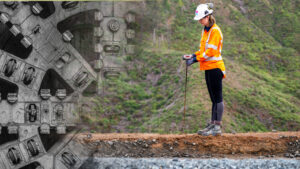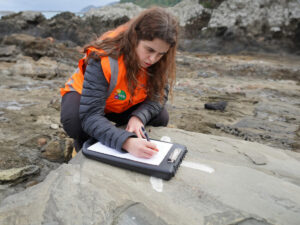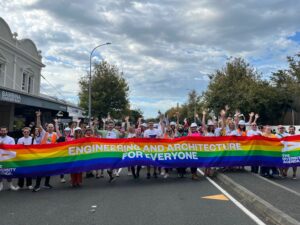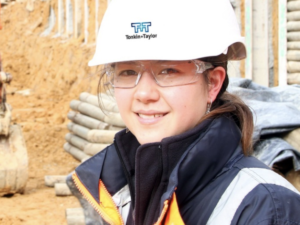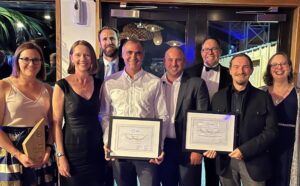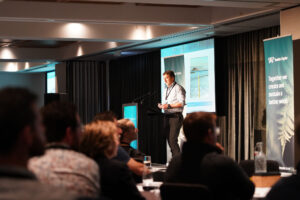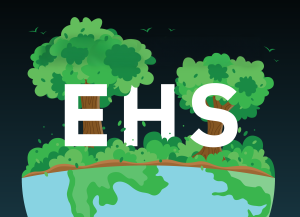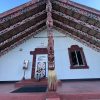Mahuru Māori (Māori Language Month) and Te Wiki o te Reo Māori (Māori Language Week) offer unique opportunities for us at Tonkin + Taylor to embrace and expand our understanding of Te Reo Māori. As we continue to deepen our commitment to Te Tiriti o Waitangi and our role in promoting indigenous knowledge, this is an important time for us to reflect on the importance of language and culture as a cornerstone of connection, understanding, and unity.
This year, we asked our people about their journey reflections and how they have developed their understanding of Te Reo Māori.
What is your journey with Te Reo Māori – where did you begin your journey?
Soph Brockbank – Waste + Resource Recovery Consultant: Nō Weira (Wales) ahau. While my parents weren’t Welsh speakers (as they never had that opportunity) I attended Welsh schools before we emigrated to Aotearoa when I was 15, so was used to a multi-lingual upbringing.
After emigrating, I had very little exposure to te Reo Māori or Kaupapa Māori in school or university.
As I grew older, and particularly once my husband and I had our tamariki, it felt increasingly wrong that I knew so little, particularly knowing the historical challenges of my language and culture. My tamariki whakapapa Māori, and as a whānau we have been on our te Reo Māori journey since our oldest started Kura Kaupapa in 2018.
Te Miringa Panapa – Water Resources Engineer: He uri tēnei nō Waikato Tainui, Ngāti Maniapoto, Ngāti Whātua, o Ngāpuhi hoki. I whakapapa Māori and come from a bilingual family, where I have always been immersed in kaupapa Māori and tikanga. However, my reo skills are still at a basic level. This year, I’ve made a dedicated effort to strengthen my te Reo Māori proficiency.

Who inspires you to learn Te Reo Māori?
Tze Wee – Group Sustainability Advisor: For me, it’s being a tauiwi (non-Māori) that calls Aotearoa their home, if I believe my people should be treated fairly, then why shouldn’t I tautoko (support) and learn te reo Māori?
Raedon Kane – Sustainability + Resources Consultant: My Mum inspires my te Reo journey! As a primary school teacher, she encourages Reo within the classroom and takes every opportunity to learn and teach it. She particularly inspires me as English isn’t her first language and she struggles with it at times but that doesn’t stop her from learning more and practicing her Reo.
Te Miringa Panapa: My whānau is my biggest inspiration. My father is fluent in te reo, as are my partner and his whānau. I’m inspired by their beautiful kōrero and want to participate fully. Deepening my connection to te reo helps me feel closer to the people I love most.
Chloe Hireme – Office Administrator: Watching my niece go to Kohanga and my other niece and nephew go to a kura Kaupapa is amazing, something I wish I had done growing up. I would love to learn more te reo and be able to have conversations with them.
What is one of your learning hacks or memory techniques?
Te Miringa Panapa: It’s all about practice! At first, I was whakamā to speak te reo in front of others unless it was perfect. But, I’ve learned that the key is to listen and speak regularly. Scotty Morrison’s Māori Made Easy is an exceptional resource too.
Soph Brockbank: A combination of formal learning (night classes in my case) and self-directed learning. I have a 3-year-old who is at Kōhanga reo and we make a purposeful effort to kōrero Māori with him, in and outside of the whare. This level works well for where I am on my reo journey, and my older Tamariki are more than happy to correct me when I get things wrong!
I think it’s about finding the spaces and people you can practice with or learn from; I am lucky enough to have this available at home, but the classes that I have attended are full of friendly, like-minded people who want to learn and practice with you.
Tze Wee: Make it fun, and enjoyable, and find little creative ways to help remember things. For example, mauī means left and both these words have four letters, whereas matau means right, and these both have five letters.

What surprised you about your journey learning Te Reo Māori?
Tze Wee: For me learning te reo Māori, has made me feel even more settled in my place in Aotearoa – I feel at home.
Raedon Kane: I have an Afrikaans accent and have been surprised by the pronunciation similarities between my language and te Reo. This has surprised me as I have been able to easily pick up and practice my Reo.
Soph Brockbank: It’s so much more than just a language journey. It’s an entry into an entire culture, history, and Kaupapa. I have loved every second of it and enjoy playing my small part as Tangata Tiriti in honouring and upholding te Ao Māori.
What has been your biggest learning so far?
Tze Wee: My biggest learning has been there is always more to learn! There are kupu (words) that I haven’t even heard of or used, or sentence structures that are unfamiliar to me, a lifelong tauira (student).
Soph Brockbank: it’s so much more than just a language journey. It’s an entry into an entire culture, history, and kaupapa. I have loved every second of it and enjoy playing my small part as Tangata Tiriti in honouring and upholding te Ao Māori.
This Te Wiki o te Reo Māori is a chance for us all to reflect on where we have grown and to take steps—whether large or small—in growing our fluency and fostering a workplace where te Reo Māori thrives.



